| |
|
|
|
|
|
|
|
|
|
|
| |
| |
 |
|
| |
莫扎特之旅
编译
文/图 2020-02-08 19:36 |
|
| |
|
|
|
|
| |
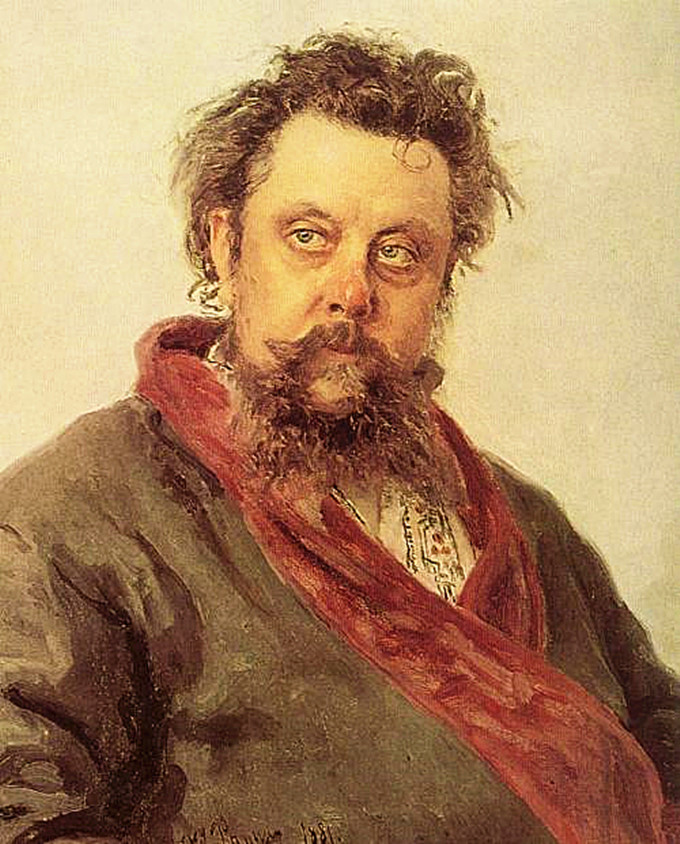 |
|
|
|
| |
穆杰斯特·穆索尔斯基(Modest Mussorgsky,1839——1881)——列宾的油画作品。 |
|
|
|
| |
|
|
|
|
| |
|
|
|
|
| |
鲍里斯 戈杜诺夫 Boris Godunov (罗斯特罗波维奇)(1989)
|
|
|
|
| |
|
|
|
|
| |
音乐历史上的今天
1874年2月8日,在文化审查部门退稿两次之后,穆索尔斯基(Modest Petrovich
Mussorgsky)大幅修改后的杰作《鲍里斯.戈多诺夫》(Boris Godunov)登上了舞台。
穆杰斯特·彼得罗维奇·穆索尔斯基(Modest Petrovich
Mussorgsky,1839—1881)1839年3月21日他出生在俄罗斯普斯科夫省卡列沃镇一个地主家庭。他的祖母曾是农奴,在他小的时候,他的姆娘就经常给他讲俄罗斯的民间故事。他的母亲在他五六岁时,就开始教他弹钢琴。穆索尔斯基在他还没有完全懂得弹奏钢琴最基本的规则时,便开始在琴键上用琴声来以自己的想像力尽可能地描述姆娘所给他讲的那些有趣的故事。尽管没有什么旋律可言,但他的即兴创作却使他在音乐上进展迅速。7岁时,他就可以演奏李斯特的小曲。当他9岁时就能在父母举办的晚会上为大家演奏菲尔德协曲了。
1849年,他开始师从赫赛尔特的弟子安东·格尔克学习钢琴课程。70年代是穆索尔斯基创作的极盛时期,可他能生活却过得极为悲惨。穆索尔斯基曾经同里姆斯基一柯萨科夫同住一起,他们两个人互相交流意见和计划,共用一架钢琴,他们安排得彼此不相妨碍,结果两个人都完成了很多工作。但是,穆索尔斯基从1873年起同一个年轻亲戚住在一起。由于喝酒的关系,他经常感到像神经错乱一般的苦痛;他衣衫褴褛,一贫如洗,特别是在歌剧《鲍里斯·戈杜诺夫》上演失败之后,他很少同朋友们在一起。1875年间甚至一度陷于无处栖身而踯躅彼得堡街头的惨境。晚年,穆索尔斯基生活更加孤独,似乎只有斯塔索夫同他保持交往,点缀着他的苦难处境。1879年夏天,由于急需解决经济上的困难,穆索尔斯基陪同一位女歌唱家到伏尔加、乌克兰和克里木旅行演出,俄罗斯南
部的自然景物在他心中唤起了很大的热情和兴奋之感,这是他的孤苦的晚年中的一个小小的光明插曲。
1880年回到彼得堡后,穆索尔斯基被迫离开公职,他重新面临逆境,旧病复发迅速把他引到悲惨的结局,终于在1881年3月28日病逝于士兵医院。
穆索尔斯基很小的时候就想当一名军官,近卫军那帅气十足的军服使他非常羡慕。在13岁那年,穆索尔斯基进入彼得堡的近卫军军官校。185
4年,他离开了军官学校,进入了近卫军波洛勃拉泽恩斯基军团,当了一名军官。1858年他决心献身音乐而脱离军界。但是由于谋生乏术,不久他又不得不到政府机关供职,这个职务剥夺了他的许多时间和精力,给他带来很多烦恼,为此,他沉溺于酒精和麻醉剂,以至伤害了自己的身体。
1863至1866年间,穆索尔斯基也像当时一些进步青年那样,在车尔尼雪夫斯基的小说《怎么办》的思想影响下,同一群年轻朋友一起过着“公社”式的生活,他们博览群书,激烈辩论他们感兴趣的一切问题,包括文学、艺术、社会、政治和道德等。穆索尔斯基的进步世界观,就是在这一时期形成的,在所有“强力集团”作曲家中,穆索尔斯基的创作最注重具有尖锐的政治性质的社会问题,也是同他的这段生活分不开的。
从60年代开始,穆索尔斯基的创作探索的主要目标集中,在歌剧上。1863年,他根据法国作家福楼拜的文学巨著《萨朗波》的题材,自己动手编制脚本和写作歌剧;1868年,他又从果戈理的喜剧《婚事》着手写作宣叙体的歌剧,但都没有完成;同间,他还根据普希金的悲剧写作歌剧《鲍里斯·戈杜诺夫》。1872年,穆索尔斯基把斯塔索夫提供的一个历史题材写一成他的第二部歌剧《霍凡兴那》,他自己还把它称为“人民的音乐剧”,借此强调人民在剧情发展中所起的主宰作用。
1874年,他又根据果戈理的中篇小说《索罗钦市集》写作他的第三部喜歌剧,但也没有完成。穆索尔斯基在他的一些歌曲和浪漫曲作品中,创造了一系列琳琅满目的形象,有的描绘风土人情;有的着重于心理刻画;有的充满了对敌人的辛辣讽刺;有的则反映了作者无限孤独的绝望情绪。穆索尔斯基的器乐作品虽然不多,但依然对俄罗斯交响音乐的发展做出了有益的贡献。
今日视频:1、穆索尔斯基的歌剧《鲍里斯
戈杜诺夫》
2、
钢琴家布纳蒂什维利演奏《图画展览会》
3、卡拉扬指挥柏林爱乐演奏穆索尔斯基的《图画展览会》
|
|
|
|
| |
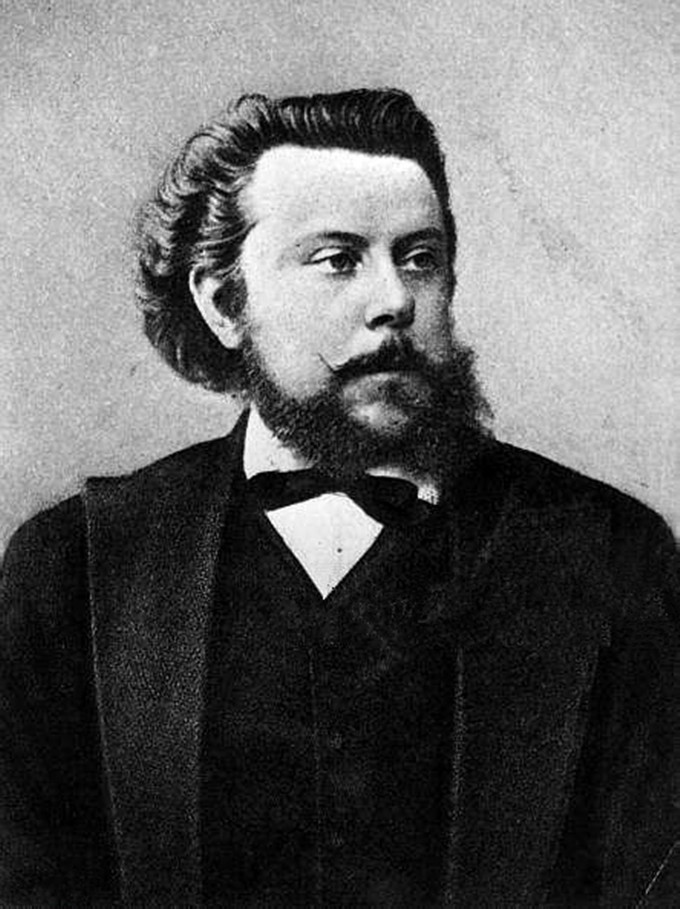 |
|
|
|
| |
|
|
|
|
| |
Today in music
history
On Feb. 8, 1874, after two rejection by the department of cultural
censorship, Modest Petrovich Mussorgsky's heavily revised masterpiece
"Boris Godunov" appeared on the stage.
Modest Petrovich Mussorgsky (1839-1881) was born on March 21,1839, to a
family of landowners in kalevo, pskov province, Russia.His grandmother
had been a serf, and when he was young his mother often told him Russian
folk tales.His mother began to teach him the piano when he was five or
six.Before he fully understood the basic rules of playing the piano,
mussorgsky began to use the sound of the piano on the keys to describe
the interesting stories that mu niang had told him as best as his
imagination could.Although there was no melody to speak of, his
improvisation allowed him to make rapid progress in music.At the age of
seven, he could play liszt.When he was nine years old, he was able to
play the field concert for everyone at his parents' party.
In 1849, he began piano lessons with Anton gerke, herselt's disciple.In
the 1970s, when mussorgsky was at his creative peak, he lived a
miserable life.Mussorgsky had lived with rimski-korsakov, and the two of
them had exchanged ideas and plans, and they Shared a piano, and they
had arranged so that they could not interfere with each other, and both
of them had done a great deal of work.But musorgsky had lived with a
young relative since 1873.From drinking he often felt the pain of a
delirium;He was ragged and penniless, and, especially after the failure
of the opera Boris godunov, he was seldom with his friends.In 1875 he
even wandered the streets of Petersburg with no shelter.In his later
years, mussorgsky's life was more solitary, and it seemed that only
stasov kept company with him, interspersed with his misery.In the summer
of 1879, mussorgsky accompanied a songstress on a tour of volga,
Ukraine, and crecree. The natural scenery of southern Russia aroused in
him a great sense of enthusiasm and excitement.
After returning to Petersburg in 1880, musorgsky was forced to leave
public service. He faced adversity again, and his relapse quickly led
him to a tragic end. He died in the soldiers' hospital on March 28,
1881.
Mussosky wanted to be an officer when he was very young and admired the
handsome uniforms of the guards.At the age of 13, musorgsky entered the
guards academy in Petersburg.In 1804 he left the academy and joined the
guards as an officer in the boroblazensky regiment.In 1858 he decided to
devote himself to music and break away from the army.But as he had no
means of making a living, he soon had to work for a government office,
which deprived him of much of his time and energy and caused him much
trouble, for which he became so addicted to alcohol and narcotics that
he hurt himself.
Between 1863 and 1866, jose sol, also like some progress youth, "to do"
the novels of chernychevsky's thought under the influence, the same
group of young friends living in "commune", they read widely, intense
debate they are interested in everything, including literature, art,
social, political, and moral, etc.It was during this period that
mussorgsky's progressive worldview was formed. Among all the composers
of the "powerful group", mussorgsky's works paid most attention to
social issues of a sharp political nature and were inseparable from this
period of his life.
Starting in the 1960s, mussorgsky's creative explorations focused on
opera.In 1863, he wrote his own scripts and operas based on the theme of
flaubert's great literary work sarampo.In 1868, he began to write an
opera of narration from gogol's comedy "the marriage", but he did not
finish it.At the same time, he wrote the opera Boris godunov based on
pushkin's tragedy.In 1872, mussorgsky wrote a historical theme provided
by stasov into his second opera, hovanchina, which he himself called
"the people's musical" to emphasize the dominant role of the people in
the development of the story.
In 1874, he wrote his third comic opera based on gogol's novella the
market of sorochin, but it was not finished either.Mussorgsky created a
series of beautiful images in some of his songs and romantic works.Some
focus on psychological characterization;Some are full of bitter satire
on the enemy;Others reflect the author's infinite loneliness and
despair.Although mussorgsky's instrumental works are few, they have made
beneficial contributions to the development of Russian symphonic music.
Today's video: 1. Boris godunov by musorgsky
2. Pianist bunadishvili playing "picture exhibition"
3. Karajan conducting the Berlin philharmonic in mussorgsky's exhibition
of pictures. |
|
|
|
| |
|
|
|
|
| |
 |
|
|
|
| |
戎装时期的穆索尔斯基 |
|
|
|
| |
1856年,已是中尉的穆索尔斯基加入了普列奥布拉任斯基近卫队,这是俄国最具贵族气质的兵团之一。他在那里结识了几个爱好音乐的军官,他们都是意大利剧院的常客。在同一时期,他结识了亚历山大·博罗丁(Aleksandr
Borodin),一位后来成为俄罗斯另一位重要作曲家的军官。博罗丁为这位音乐家描绘了一幅非常生动的画面。 |
|
|
|
| |
In 1856, by now a
lieutenant, Mussorgsky joined the Preobrazhensky Guards, one of Russia’s
most aristocratic regiments, where he made the acquaintance of several
music-loving officers who were habitués of the Italian theatre. During
this same period he came to know Aleksandr Borodin, a fellow officer who
was to become another important Russian composer. Borodin has provided a
very vivid picture of the musician: |
|
|
|
| |
|
|
|
|
| |
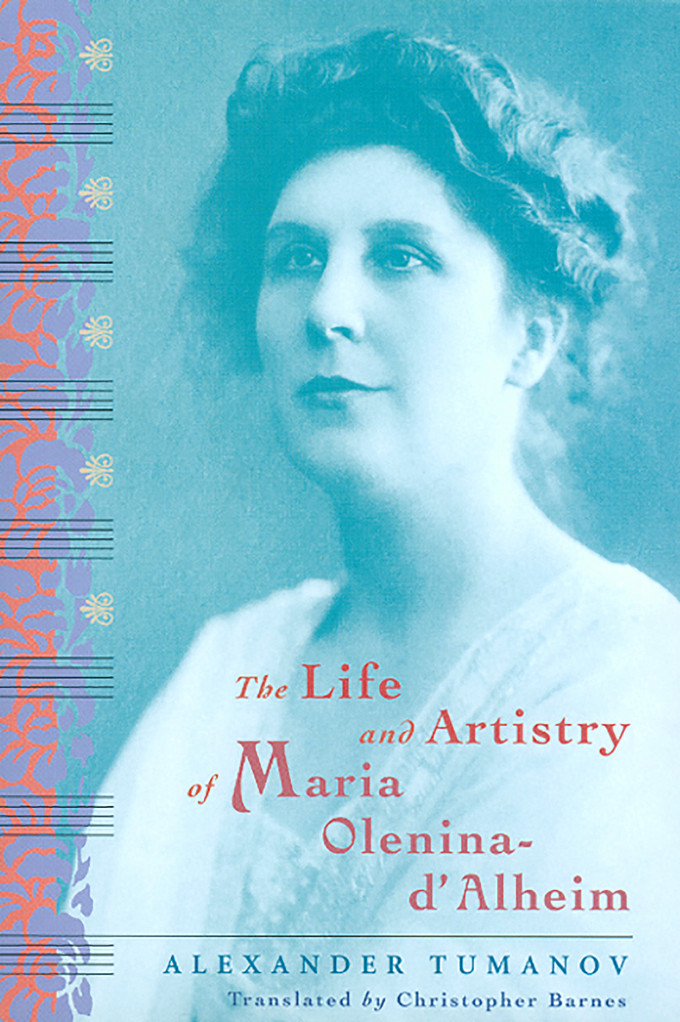 |
|
|
|
| |
The Life and Artistry of Maria Olenina-d'Alheim
|
|
|
|
| |
亚历山大·图马诺夫(Alexander
Tumanov)这部传记《玛利亚·奥列宁娜的生活和艺术》介绍了歌唱家玛利亚·奥列宁娜如果在欧洲大力推崇穆索尔斯基的音乐作品。 |
|
|
|
| |
|
|
|
|
| |
亚历山大·图马诺夫(Alexander
Tumanov)将“一位具有反叛精神、才华横溢、不屈不挠的艺术家的形象带到了我们的生活中,他的名声和对俄罗斯音乐的贡献……只有她日益增长的执著和她政治观点中堂吉诃德式的本质才能与之匹敌。”——普林斯顿大学卡里尔·爱默生教授她本身就是一位伟大的艺术家,被她那个时代最好的音乐家所认可。”——索邦大学教授埃菲姆·埃金德,俄罗斯抒情歌谣的第一人,20世纪早期欧洲古典音乐表演的关键人物。玛利亚有能力“唱出这首歌”,把歌词和音乐结合在一起,成为一门声乐朗诵艺术。玛利亚的歌唱灵感来自于她与“为数不多”的俄罗斯作曲家——穆索尔斯基、鲍罗丁、里姆斯基-柯萨科夫和巴拉基列夫——的个人联系。她是第一个把穆索尔斯基的音乐带到西欧的人。1908年,玛丽亚和她的丈夫、音乐评论家和作家皮埃尔·达尔海姆(Pierre
d’alheim)创立了“歌曲之家”(the House of
Song)。通过她的表演、他的讲座、他们的出版活动以及举办国际比赛,《歌曲之家》影响了欧洲的音乐氛围。亚历山大·图马诺夫通过她自己和她的同代人巴拉基列夫、科尔托、贝莉和拉威尔的作品,在欧洲重现了这一激动人心的古典音乐时新时代。 |
|
|
|
| |
|
|
|
|
| |
Alexander Tumanov has brought "to life the picture of a
rebellious talented artist of unbending principle, whose renown and
service to Russian music...are
rivalled only by her growing obstinacy [and] the quixotic nature of her
political views." -
Professor Caryl Emerson, Princeton University " A performer who
sacrificed her own creative life in order that the world should hear of
the composer Mussorgsky. A
great artist in her own right recognized by the best musicians of her
age." -
Professor Efim Etkind, Sorbonne University Maria d'Olenina d'Alheim, the
first performer of Russian Lieder, was a pivotal figure in early 20th
century European classical music performance. Maria
had the ability to "tell the song," uniting words and music in an art of
vocal declamation. Her
personal ties to the "Mighty Handful" of Russian composers--Mussorgsky,
Borodin, Cui, Rimsky-Korsakov, and Balakirev--inspired Maria's singing. Her
performances of Mussorgsky were the first to bring his music to western
Europe. In
1908, Maria and her husband, music critic and writer Pierre d'Alheim,
established the House of Song (Dom pesni in Russia, La Maison de Lied in
France). Through
her performances, his lectures, their publishing activities and by
hosting international competitions, the House of Song influenced the
musical climate of Europe. Through
her own words and those of her contemporaries, Balakirev, Cui, Cortot,
Bely, and Ravel, Alexander Tumanov has recreated this exciting period of
classical music in Europe. |
|
|
|
| |
|
|
|
|
| |
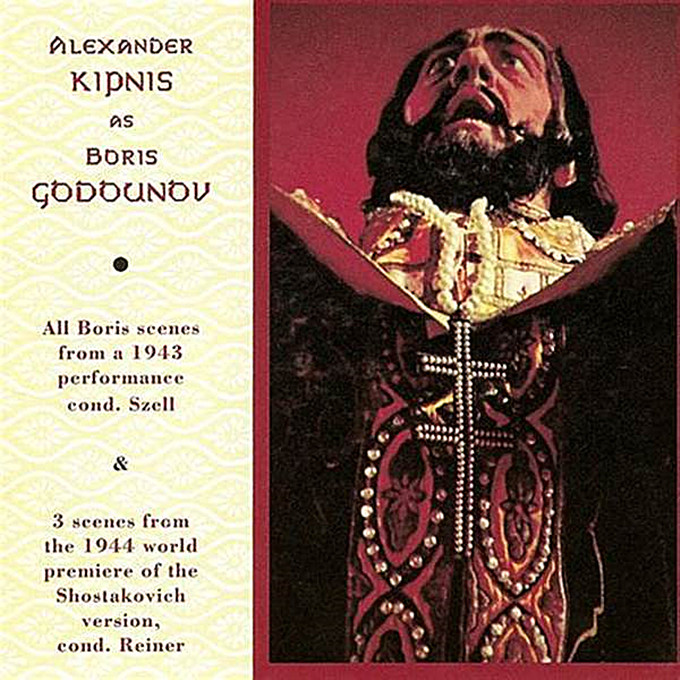 |
|
|
|
| |
穆索尔斯基的歌剧《鲍里斯
戈杜诺夫》的海报 |
|
|
|
| |
故事发生在大约1600年,俄国沙皇鲍里斯原来是伊凡雷帝的大臣,他谋杀了应该继承王位的伊凡雷帝的儿子季米特里,强迫人民拥戴自己当皇帝。年轻的修道士、政治冒险家格里高利假冒季米特里的名字,逃到立陶宛,利用人民对鲍里斯的不满,向他兴兵讨伐,赢得了人民的支持。鲍里斯被这一切吓坏了,仓促把继承权交给了他儿子费奥多尔,自己在精神错乱中死去。这部歌剧是俄罗斯民族乐派的优秀作品,其音乐在运用平行和弦、民歌调式等方面,特别是在剧中突出群众场面
,加强合唱的地位,不过分显耀主角
,是歌剧创作上的革新。该剧有几个修订版,其中有里姆斯基-科萨科夫、肖斯塔科维奇等人的版本,后者被人公认为最好的也是最接近作者意图的。换句话来说,指挥和演出者应该以穆索尔斯基为起点,而不是像里姆斯基那样用过于华丽的乐队色彩,“正确的”和声,过分强调鲍里斯而不是有大量合唱的作为真正主人公的俄罗斯人民。 |
|
|
|
| |
The story takes
place around 1600. Tsar Boris of Russia turned out to be a minister of
Ivan the terrible.Gregory, a young monk and political adventurer, faked
dimitri's name and fled to Lithuania, where he took advantage of the
people's dissatisfaction with Boris by rallying his troops and winning
their support.Frightened by all this, Boris hastily handed over the
succession to his son fyodor, and died of insanity.This opera is an
excellent work of the Russian national music school, whose music USES
parallel chords, folk song modes and other aspects, especially in the
play to highlight the mass scene, strengthen the status of the chorus,
not too prominent leading role, is an innovation in opera creation.There
are several revisions to the play, including those by rimsky-kosakov,
shostakovich and others, the latter being considered the best and
closest to the author's intentions.In other words, conductors and
performers should start with mussorgsky, not, as in rymsky's case, the
over-flamboyant band colours, the "right" harmonies, the over-emphasis
on Boris rather than the Russian people, the real protagonists, who have
plenty of choruses. |
|
|
|
| |
|
|
|
|
| |
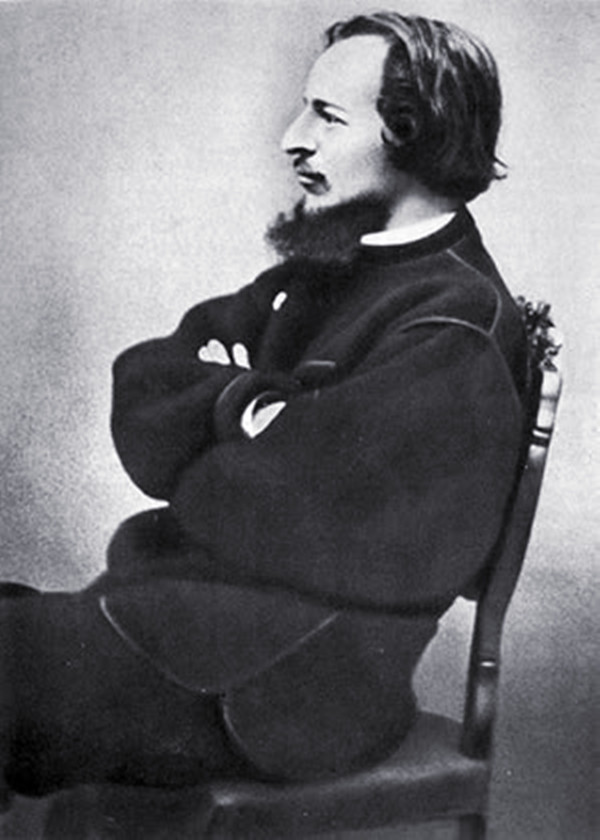 |
|
|
|
| |
维克多·哈特曼,Viktor
Hartmann (1834-1873)建筑师,艺术家。
穆索尔斯基根据他的绘画创作了《图画展览会》钢琴曲。
|
|
|
|
| |
|
|
|
|
| |
【穆索尔斯基】 图画展览会 卡拉扬 指挥
|
|
|
|
| |
|
|
|
|
| |
穆索尔斯基 图画展览会 捷杰耶夫指挥柏林爱乐
|
|
|
|
| |
|
|
|
|
| |
|
|
|
|
| |
未得原作者编者授权严禁转载www.mt77.com任何内容 |
|
|
|
|
|
|
|
|
|
|
|
|
|
|


